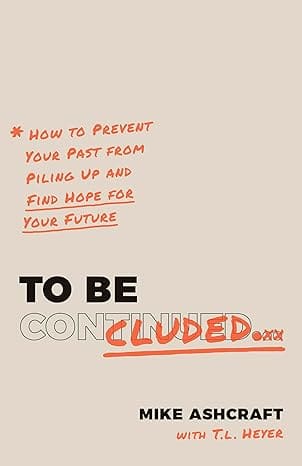- Home
- Relationships
- The Tension of the Faster

The Tension of the Faster
 Excerpt taken from To Be Concluded: How to Prevent Your Past from Piling Up and Find Hope for Your Future by Pastor Mike Ashcraft
Excerpt taken from To Be Concluded: How to Prevent Your Past from Piling Up and Find Hope for Your Future by Pastor Mike Ashcraft
The Tension of the Faster
“If I can just get through this, then everything will be okay.” Have you ever said that to yourself? I feel like I’ve been saying that since 2012.
The list of things to get through becomes longer and longer. The only solution to this increasing demand is to pick up the pace, to go faster and faster. Before you know it, you’re disconnected from everything and everyone that matters to you. The faster you go, the more things blur. You can’t see clearly in a hurry.
When your only sense of pace is “faster,” you lose the thing you need to gain understanding: perspective.
Your pace prevents perspective.
In 2007, my one word was finish. I picked that word because I wanted to be better at finishing tasks. Things were moving fast and furious in my life, and I didn’t like the feeling of tasks undone. I wanted to be better at finishing my messages, the articles I needed to write, the emails I needed to respond to, the books I was reading — all of it. I wanted to finish.
In retrospect, I got really good at finishing. I’d finish my tasks, finish my lists, and feel a general sense of accomplishment in my workday.
And then I’d come home exhausted.
My kids were small then, and they were excited for their evenings with dad, but I was so tired. I’d say, “Kids, let’s see how fast we can do our baths and bedtime stories to see who can get into bed first. Ready? Go!”
Have you ever raced your kids to bed?
Obviously, you don’t do this because you’re trying to make memories. You do it because you’re trying to get them out of your hair. Because they’ll take up more energy than you have.
Why was I in such a hurry?
I’ll tell you why: I was in a hurry to get in my recliner so I could watch ESPN, while I relaxed in my shorts and black socks. (For some reason, that was the picture of adulthood for me: watching TV in my own home, wearing shorts and black socks.) I was racing my kids to bed so I could get into that ridiculous position that felt like winning to me.
Reality hit me like a freight train when I realized the pattern I had created. I had finished my workday at five, but I wasn’t truly finished with my day at all. My little girls were growing up, and their dad was rushing through their childhood, all in an effort to get through.
It was midyear when I realized this. This is one of the great things about choosing one word: the focus you begin the year with usually doesn’t last through the end. The perspective shifts, and you have to shift with it to understand what you’re seeing. Six months in, I began to think about what it could look like to finish the day well, to actually finish the day by being present with my family. Instead of just drifting off into a coma at the end of the day, maybe I could actually go to sleep knowing I had finished well.
For many of us, time seems to barrel forward. Like a snowball down a hill, collecting more and more stuff and getting bigger and bigger until our lives feel like an avalanche rushing out of control and overtaking everything. Nothing’s finished, and all of our problems and struggles — even our successes — just seem to be one continuous drive forward into the future. This creates an unsustainable constant that drives us mad.
Rick Warren said, “Nobody pressures you without your permission.” That’s a freeing idea: nothing has the power to pressure me unless I allow it. But without perspective, things pile up and put pressure on us without our permission. We feel buried beneath that list of the things we should have done if we were really the people we hoped to be.
We feel so much pressure when we are not accomplishing things as fast as we want to or when things aren’t going as we had hoped they would. The result is perpetual frustration. As the future gets closer, the more pressure we feel. This is why we wake up feeling crushed under the weight of a new day. We have so much to get done before the future gets here.
The undone creates pressure, and it’s not just the undone, it’s the uncertainty. We’ve got so much to do, and we don’t necessarily know what it is.
As adults, we don’t know what we should have done, but we do know that it’s more than what we’re currently doing. So we ramp up. We want our kids to do better than we did, so we put pressure on them to do more than we’ve done, even though we’re not sure what that is. We’re just piling more pressure on, more and more, from one generation to the next, creating a crushing burden no one can bear.
We look at all that needs to be done, and we think there are only two categories: do everything, or do nothing. But there is a third option: do the things we are supposed to, in order to become the person we are created to be. Instead of rushing to do it all, we need to stop to ask if the things we’re doing are things we should be doing.
We need to stop and ask ourselves: Did this begin with a choice? Did I make an intentional choice to follow God’s invitation in the moment, or did I get swept into the pressure to hurry? When we hurry, we begin to do things we don’t notice, and we do things we never intended.
Hurry is the enemy of the heart and deep character change. We have created an entire industry devoted to this enemy of peace and sanity. We call it hustle, and we make it sound heroic. But hustle is just one more way for the continuation of our past to pile up and the continuation of the pressure we feel about the coming future. This is a recipe for an implosion.
Hurry isn’t just about pace; it is about pressure. Dallas Willard wrote extensively about this, proposing that hurry is the great enemy of spiritual life in our day. He said we must “ruthlessly eliminate hurry.” We have got to get out from under the pressure, and we do that by disrupting the continuation and drawing a conclusion. This is how we establish once again the rhythms in which God has invited us to live.
Jesus was never in a hurry. As Jesus became more and more popular, he was wanted all over the place. He was actually the only one who could have done all the things he was asked to do, but he modeled for us this unhurried way of life. His disciples were rushing him from one appointment to the next, trying to stay on top of his schedule. I picture them calling ahead on their phones, making sure reservations are in place. And then Jesus would throw off their entire schedule when he stopped to speak to two blind men. I wonder how often we miss the things God has for us simply because we are trying so hard to get to where we think we ought to be.
We all know the pressure to impress or to be perceived as productive. A friend of Jesus knew this pressure well. Martha was known as “the one who could get it done.” If there’s a to-do list, she’ll conquer it. Jesus was coming for lunch, and her image was on the line. Her motives were not bad, and neither are ours, necessarily. But when we get rushed, we forget what is important.
Jesus shows up to her house for lunch, and Martha is busily rushing around to complete the details while her sister Mary sits down with Jesus. Martha is busy hosting, and Mary is not busy at all. Martha has had enough.
I imagine Martha trying to make eye contact with Mary, getting her to clear the dishes, but Mary misses her hints. Martha is furious; Mary is oblivious. Luke records that Martha was distracted with so much serving, but Mary was focused, fully present.
Finally, Martha leans on her last resort: she drags Jesus right into her feud with her sister. I’m not sure there’s a worse place to be than stuck in a spat between two sisters. “Lord, do you not care that my sister has left me to serve alone? Tell her then to help me” (Luke 10:40 ESV).
Massive assumption. She assumed Jesus agreed with her, and she told him to correct her sister. Jesus responds to Martha, and perhaps this is his response to you, “You are anxious and troubled about many things, but one thing is necessary” (vv. 40–42).
Jesus seems to want her to make room for him. (Take that, innkeeper.)
There’s nothing more important than an encounter with Jesus. How often are we so anxious and troubled about so many things that we neglect the one thing that is necessary in order for everything else to find its place and purpose? Productivity has become our default measure of success. So many of us are overwhelmed by the goal of productivity, and insecurity runs rampant when we can’t rattle off an impressive list of the things we have produced in a given day — or by the time we turn thirty-five. We deceive ourselves with thoughts like, If I had produced more, then I would be more. If I had been more competitive, I would be more. If I had accomplished more, if I had a better resume. If I had more income, if I had more meetings, if I had a better sense of identity—then I would be more. These are examples of destination thinking, and they are simply untrue. They keep us continually chasing, and therefore they keep us from being still and making room for Jesus.
“This excerpt is from To Be Concluded by Mike Ashcraft, published by B&H Publishing Group. Get the book anywhere books are sold.”
…
Order your copy of To Be Concluded: How to Prevent Your Past from Piling Up and Find Hope for Your Future by Pastor Mike Ashcraft
Trending Now
Sign up today for your Inspiration Today Daily Newsletter
Supercharge your faith and ignite your spirit. Find hope in God’s word. Receive your Inspiration Today newsletter now!
Mike Ashcraft
Mike Ashcraft serves as the Senior Pastor at Port City Community Church which he helped start in 1999. He married Julie, his high school sweetheart, in 1992. They grew up in Atlanta and relocated near the beach in southeastern North Carolina. He enjoys family time with his two daughters and one son-in-law. The beach is his happy place and surfing is the only hobby he needs. Learn more at bhpublishinggroup.com/contributors/mike-ashcraft/
Related Articles
June 27, 2025
Who Is My Neighbor: Bridging the Gap Between Emancipation and Equality (Part 2)
In “Who Is My Neighbor: Bridging the Gap,” we ask what it means to truly see, hear, and love our…
June 24, 2025
It’s All About Love
This excerpt explores the beauty of God’s design for marriage, showing how Scripture reflects His…
June 10, 2025
Freedom in Forgiveness
This excerpt explores the healing process and power of forgiveness in marriage, emphasizing how it…
June 2, 2025
The Mystery of Marriage
This excerpt explores the mystery of marriage as a divine reflection of Christ’s love for the…
Next Steps To Strengthen Your Walk
Inspiration Today Newsletter
Supercharge your faith and ignite your spirit. Find hope in God’s word. Receive your Inspiration Today newsletter now!
Christian Articles
Find articles to strengthen your walk and grow your faith. We have a wide range of topics and authors for you.
Submit A Prayer Request
We are here for you. Simply click on the button below to reach us by form, email or phone. Together we will lift our hearts and voices with you in prayer.





